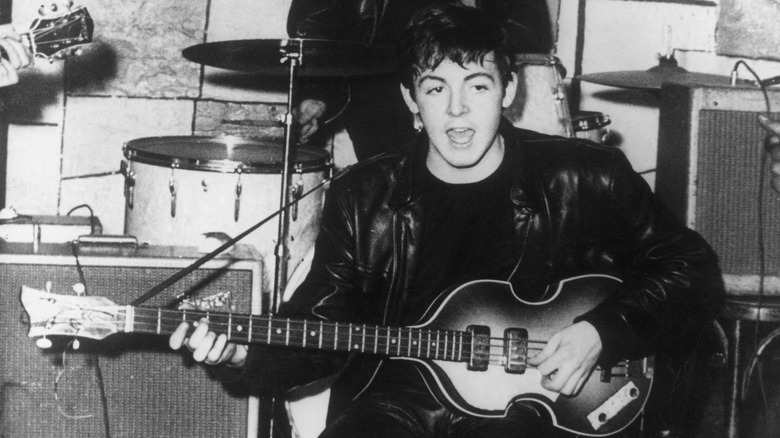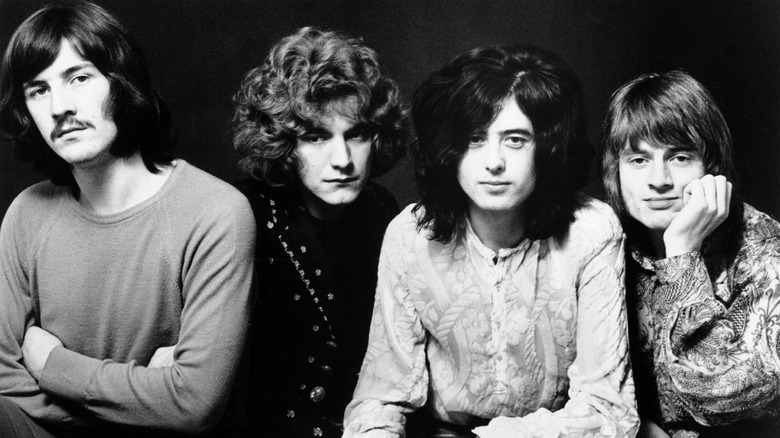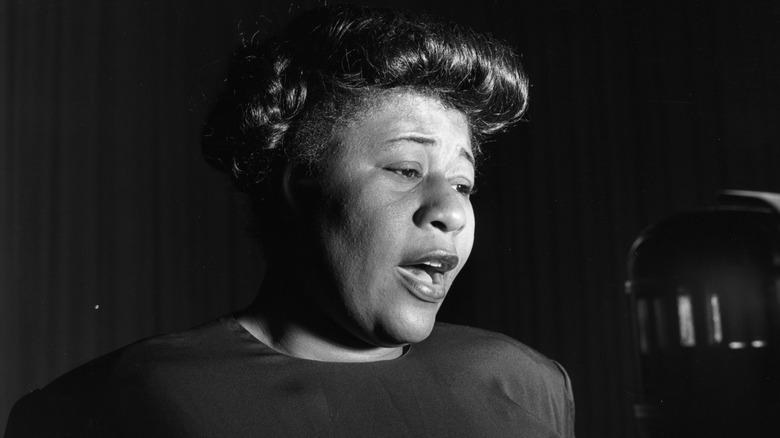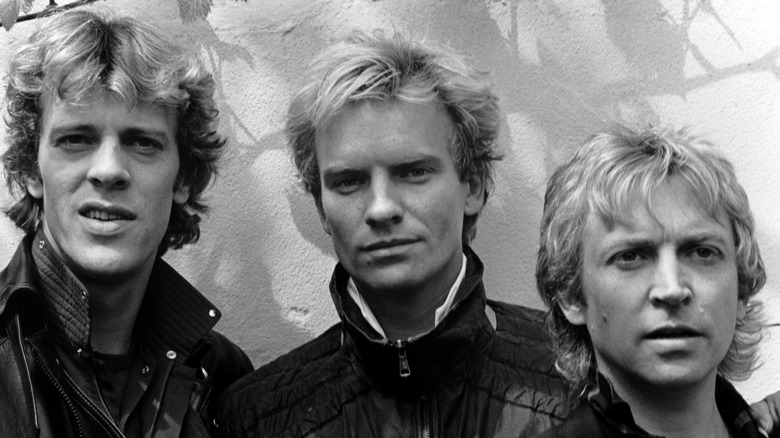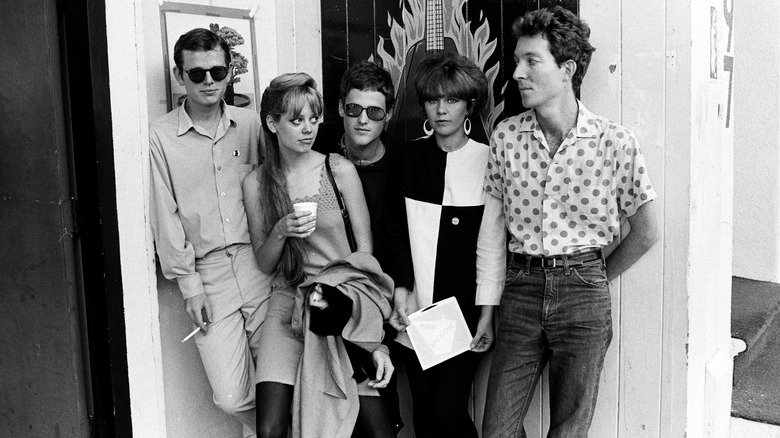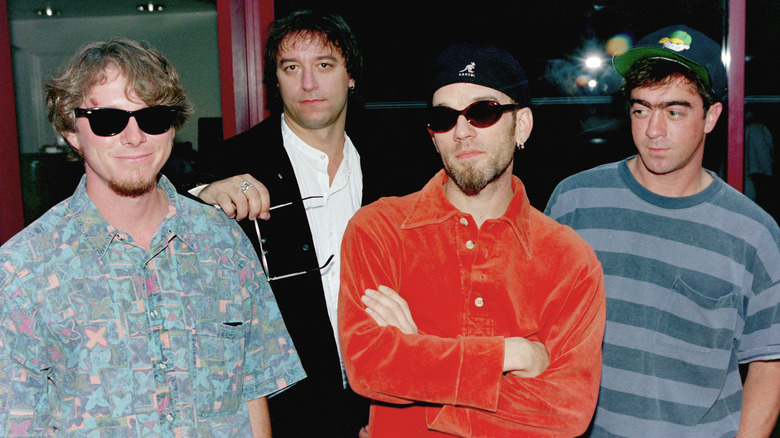Mistakes In Songs That Make Them Better
One of the most beautiful things about music is how raw and real it can be. Musicians dig down to the deepest part of their souls and share their most personal thoughts and feelings with us, accompanied by some intense guitars, big drums, or soothing piano notes to round it all out. To the audience, the songs our music idols produce may seem absolutely blemish-free, pure perfection on a CD or in a playlist. However, musicians are people, too, and they make mistakes — some of which sneakily end up on your favorite tracks.
If you listen closely, songs from legendary acts like Led Zeppelin, Nirvana, Metallica, and Radiohead contain little-known blunders. These mistakes range from accidental equipment malfunctions and singers coming in early to simple slips of the tongue. They may not be totally obvious at first, but once you identify them, you won't be able to un-hear them — nor would you want to. They add unique signatures to the music — or, in some cases, make the music better overall. Now, let's take a look at some mistakes in songs that actually make these tunes better, and how these slip-ups happened in the first place.
Paul McCartney's name flub in Ob-La-Di, Ob-La-Da
Beatles enthusiasts are familiar with the whimsical tune "Ob-La-Di, Ob-La-Da" from 1968's "The White Album" (via Genius). It tells the story of two people named Desmond and Molly meeting, falling in love, having children, and living happily ever after with their cozy life. Admittedly, it's one of those Beatles songs that fans seem to love or hate, according to Far Out Magazine — and this mistake may be what drives so many fans nuts.
"Ob-La-Di, Ob-La-Da" paints a rosy picture of Desmond and Molly's life, mentioning in one verse how Desmond lets the children lend a hand and how Molly stays at home and does her pretty face while, later in the evening, playing with a band. That verse is repeated before the last chorus, but this one has a mistake in it. According to Songfacts, McCartney swaps Desmond and Molly's names, singing, "Molly lets the children lend a hand / Desmond stays at home and does his pretty face / And in the evening, she's a singer with the band." It was a mistake, but McCartney left it in to purposefully confuse listeners. Keep that little fact in mind next time you need some Beatles trivia.
That plane sound in Black Country Woman
Many rock n' roll enthusiasts consider Led Zeppelin one of the greatest bands ever — Rolling Stone even ranked them number 14 on its 100 Greatest Artists of All Time list. Their sound is perfection to rock fans' ears, which is why it may be hard to believe that any Zeppelin song has a mistake in it. But, it's true — one of best bands to ever shred has a song blunder.
Listen to "Black Country Woman" off the band's 1975 double album "Physical Graffiti" (via Genius). According to Songfacts, you'll hear a plane flying overhead as recording was underway. The sound engineer is heard saying he doesn't want to get the plane sound again, but then Robert Plant says, "Nah, leave it, yeah" — giving the intro a unique and fun twist.
So, what's the deal with the plane sounds? Wasn't Led Zeppelin recording in a fancy studio that blocked out noises, given their mega-success in the mid-'70s? According to "Whole Lotta Led Zeppelin: The Illustrated History of the Heaviest Band of All Time" by Jon Bream, it was clear from the start that the "Physical Graffiti" album wasn't going to be "high art." As the book states, "Instead, they [Led Zeppelin] intended to record what moved them rather than what would appease a record company." So, it would make sense that they didn't mind a few plane noises as they recorded at Headley Grange in Hampshire, England (via Ultimate Classic Rock).
Billie Joe Armstrong's expletive in the beginning of Good Riddance (Time of Your Life)
Anyone who has graduated high school since 1997 has likely heard Green Day's "Good Riddance (Time of Your Life)." The acoustic tune features reflective lyrics that encourage listeners to look back as they move forward in life (see the chorus, "It's something unpredictable / But in the end, it's right / I hope you had the time of your life"). Green Day frontman Billie Joe Armstrong wasn't exactly in a happy-go-lucky mood when he penned the song, though. According to Louder Sound, it was more of a spiteful tune Armstrong wrote about an ex-girlfriend's move to Ecuador. Alas, people looked beyond the sarcasm and spite as the song became a staple at weddings, graduations, and even funerals. While it's one of Green Day's most popular songs (it peaked at number seven on the Billboard Mainstream Rock Airplay chart), its album version isn't perfect — just take a listen to the intro.
According to Songfacts, if you listen to the album version of "Good Riddance (Time of Your Life)," you'll hear Armstrong play the wrong opening note twice, drop an f-bomb, and then play the song — third time's a charm, after all. His initial mistakes were left on the album version of the tune, but were cut from radio edits. Armstrong's mess-up at the beginning adds to the realness of the tune.
Ella Fitzgerald's improvised lyrics during Mack the Knife
Ella Fitzgerald is one of the most iconic voices in jazz history, lending her unmistakeable sound to songs like, "Dream A Little Dream of Me" and "A-Tisket, A-Tasket" over her decades-long career. The "First Lady of Song" and "Queen of Jazz" had some serious pipes, but she was also extremely cool under pressure — even if she flat out forgot song lyrics. Case in point: her 1960 performance of "Mack the Knife" in West Berlin.
According to NPR, Fitzgerald was in the middle of an incredible performance in West Berlin (where she was recording her live album "Ella in Berlin") when she started crooning her cover of "Mack the Knife", a song that had been done before by Bobby Darin and Louis Armstrong. She got halfway through the tune with no issues ... that is, until she forgot the rest of the song's lyrics. Yikes. Ever the entertainer, Fitzgerald didn't panic at the mistake — instead, she scatted her way to the end, giving the song a unique Fitzgerald jazz spin. Her West Berlin rendition of "Mack the Knife" was so good that it earned her a Grammy for Best Female Vocal Performance — Single Record Or Track. Now that's a move only one of the best in the industry could pull off.
A random piano note in the beginning of Roxanne
"Roxanne," The Police's impressive debut single, is one of the English band's most iconic songs — it was even inducted into the Grammy Hall of Fame in 2008. It seems perfectly crafted from beginning to end as lead singer and bassist Sting croons about falling in love with a sex worker, but even The Police's biggest fans may not know there's a little mistake in this seemingly flawless song.
If you listen to the intro of "Roxanne," you hear a random piano note about five seconds in, followed by a laugh, before Sting comes in with the lyrics. Turns out, that wasn't part of the song's original composition — it was a perfectly timed Sting blunder. According to Revolver magazine, Sting admits that he was feeling tired while recording, so he decided to have a seat on a closed piano lid. Plot twist: the piano lid wasn't actually closed, and Sting would up playing that piano chord with his butt. As the ensuing laugh hints at, the band thought this was hilarious, so they left it in the song. The piano note sounds like it naturally fits into the intro, so there's a good chance fans didn't realize it was a happy mistake. Don't be surprised if the note stands out more the next time you listen.
James Blunt's early start on You're Beautiful
James Blunt's smash hit "You're Beautiful" dominated radio play in 2005 and into 2006, reaching the top spot on Billboard's Hot 100 chart in March 2006. According to The Guardian, Blunt wrote the song after passing by an ex-girlfriend with her new boyfriend. While the interpretation of the song is in the ears of the listener (some think it's romantic, but for others, it's a bit creepy), one thing is for certain — there's a mistake in the beginning of the song that makes it unique.
As The Guardian reports, Blunt sings the opening line, "My life is brilliant" twice at the start. This wasn't intentional — Blunt actually had a false start on the song. He didn't mind, though — in fact, he thought it was a fun joke, so the extra line was left in the song. However, according to Songfacts, the extra line was cut from radio versions. Listeners can easily find the unedited version online, though, if they wish to hear the bonus intro line.
The tin roof, rusted line in Love Shack
"Love Shack" was a massive hit for new wave darlings the B-52's, reaching number three on the Billboard Hot 100 chart in November 1989. People couldn't get enough of the catchy tune that depicts a club where people could simply be themselves and let loose. It's deliciously fun, but listeners may not know there's actually a mistake at the tail end of the song.
About 30 seconds before the song ends, there's a breakdown where B-52's frontman Fred Schneider sings, "You're what?" and Cindy Wilson comes in with the line, "Tin roof, rusted" (one of the most misinterpreted lyrics in pop, according to Songfacts). As Songfacts also explains, Wilson's tin roof line wasn't intended. The track actually halted while Wilson was singing, but she didn't stop with it — she just kept going with the lyrics. The band liked the way it sounded, so they decided to stop the music altogether during her line. It makes for an interesting break in the song, but fear not — the signature upbeat sound of "Love Shack" continues on as the song concludes, ending in spectacular fashion.
Michael Stipe's laugh in The Sidewinder Sleeps Tonite
A favorite amongst college kids in the '80s and early '90s, R.E.M. was one of the first alternative rock bands to bring the genre to the mainstream, with hits like "Losing My Religion" and "Everybody Hurts" catapulting them to stardom. Their 1992 hit album "Automatic for the People" features some quintessential R.E.M. songs, including "Man on the Moon," "Drive," and "The Sidewinder Sleeps Tonite" (via Genius). It's actually on "The Sidewinder Sleeps Tonite" that you'll hear a whimsical mistake — thanks, in part, to a famous children's book author.
Some of the lyrics in "The Sidewinder Sleeps Tonite" are "A candy bar, a falling star, or a reading from Doctor Seuss" — and if you listen to the full line, you hear lead singer Michael Stipe laugh after the Doctor Seuss line, according to Far Out Magazine. As Songfacts explains, the silly laugh was due to a mispronunciation. Apparently, Stipe was having trouble pronouncing "Dr. Seuss" — he'd say "Zeus" instead. He thought the silly error was worth a chuckle, and the laugh made it into the final recording. As long as "The Sidewinder Sleeps Tonite" plays, the chuckle will live on.
Kurt Cobain coming in early on Polly
In addition to producing "Smells Like Teen Spirit," one of the most defining and recognizable songs of the '90s, rock icons Nirvana created songs that tackled serious topics — one of which was based on a horrific event. According to Far Out Magazine, their song "Polly," off their smash-hit album "Nevermind," was written after frontman Kurt Cobain read about the real-life kidnapping and assault of a Washington teenage girl in the newspaper. Nirvana fans may know that bit of trivia about "Polly," but they may not know that the song has a noticeable mistake in it.
About a minute and 55 seconds into the song, you hear Cobain sing, "Polly says," pause, then continue singing, "Polly says her back hurts." As Songfacts explains, that first "Polly says" line was actually Cobain accidentally coming in early. It was a mistake, but one that the band and those working on the record liked — and as such, it was kept in the recording and became part of the song.
A guitar string breaking in Master of Puppets
Metal gods Metallica have a slew of successful songs under their belts — one of the most successful and popular being "Master of Puppets" off their 1986 album of the same name (via Genius). The song of master and puppet thrashes hard, and no one knows that better than Metallica guitarist Kirk Hammett. In fact, his epic shredding caused a pretty rockin' mistake on the song.
In an interview with Guitar World, Hammett's admits that, during the final guitar solo, he accidentally pulled the top string off of the fretboard of the guitar, which created a really high, noticeable note. Hammett says he thought he screwed up the solo with that blunder, but according to Songfacts, everyone actually loved it, so it stayed on the recording. The sound is gnarly, but Hammett told Guitar World that he hasn't been able to replicate that sound since, meaning it forever lives in the track.
Jonny Greenwood's sabotaging guitar rips in Creep
Some artists adore the breakout hits that made them stars ... and others, frankly, despise them. British alternative rockers Radiohead fall in that latter category. Their breakthrough, self-loathing hit "Creep" launched them to superstardom in the early '90s, but the song doesn't exactly bring warm and fuzzy feelings to members of Radiohead. According to The Guardian, lead singer Thom Yorke called the song "Crap" instead of "Creep," proving just how little he, and the rest of Radiohead, cared for the song. The group doesn't cover up their disdain for the tune — and for guitarist Jonny Greenwood, that disdain actually started in the studio.
As Far Out Magazine explains, Greenwood thought the song was "too quiet and pathetic," so in an attempt to sabotage it, he hit some guitar rips during the chorus while the band was practicing. His act of defiance had the opposite effect, though; it brought some much-needed angst to the song, giving it an edge that was impossible to ignore. Producers thought the guitar stabs were instrumental to the song's sound, and as such, they were added in during the song's recording. So, if Greenwood was satisfied with the way "Creep" originally sounded, we'd have a very different Radiohead debut single.
A slippery stick in Aja
Steely Dan's sound was one of the most distinct of the '70s, blending jazz and rock to create their signature music. They've produced seemingly perfect hits like "Reelin' In The Years" and "Rikki Don't Lose That Number," but there's one Steely Dan song that contains a sneaky blunder: "Aja."
1977”s "Aja" masterfully combined jazz and rock, creating one of Steely Dan's most impressive songs. According to Far Out Magazine, it was also the first song that drummer Steven Gadd played on — and he reportedly did his drum solo in one take. Yeah, impressive. Gadd's playing is nothing short of incredible, but between the 4:45 and 5 minute mark, you can hear a Gadd slip-up. As Ultimate Classic Rock explains, Gadd's drum stick actually slipped and dinged the drum's rim, creating a well-timed note that blended in well with the song's sound. It legitimately sounds like it belongs in the track — and as such, the band kept the accidentally perfect note in the song. Good luck trying to play that one live.

